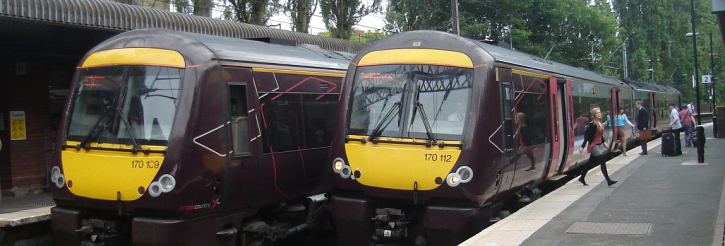Publicly accountable railways and gas and electricity supply are essential. But its not about ideology.

The calls for the "Re-Nationalisation" of the railways are wrong. Wrong because the word "Nationalisation" is loaded and linked with bad memories of the old inefficient "Nationalised Industries". Wrong also because it suggests that it is something that is an ideologically good idea - shades of the Labour Party's now deleted Clause IV of its constitution: "common ownership of the means of production, distribution and exchange". We need a new language.
We live in a mixed Economy within which decisions are, or should be, taken rationally not ideologically. It is, as I have written before, a big "Public/Private partnership" with as its goal the outcome of maximising utility for all. In the main the Public sector should not be involved in manufacturing, commerce, trade etc - certainly in those sectors and businesses where competition is real. The Government should not own banks or financial services institutions though of course it should regulate them (better!). Transport is, however, another matter as is part of the Energy supply sector.
Any economy has to have a reliable transport and energy infrastructure and it is the duty of Government to provide it. In the United Kingdom Government builds and (mostly) maintains the road network. The same with Rail via "Network Rail" which had to be created after the disastrous private sector "Railtrack" failed so abysmally. The Airports may be privately run - but they are public assets, as are the ports.
The energy sector also has public assets in the electricity and gas networks (pipelines and transmission cable systems). Now there is nothing wrong with private sector companies using public assets if it is in the public interest. So a busy transport activity like buses on (say) the London/Oxford route has two operators who compete on services and price. The passenger is the beneficiary and there would be no credible case for taking these operators into public ownership and combining them. The railways, however, are different. As, in my view, is Gas and Electricity distribution to domestic users.
The rail network is publicly owned, but the train companies that use it are privately owned and operate franchises. In effect they are private sector monopolies. Unlike the London to Oxford buses there is little or no competition. You want to go to London from Manchester - Virgin Trains is your only serious choice. And in the busy and highly profitable London commuter zone there is also only one operator on any one route. No consumer choice at all.
The State is involved in the railways not only as owner of the track network but also the stations - and as the provider of subsidies as high as £4billion per annum to operators in order to keep open "uneconomic" but judged useful routes. Meanwhile the private sector monopolies, like Virgin, pay shareholder dividends and of course make profits. These would be absent without subsidy! The myriad of operators have different names, different fare structures, different booking systems and there is no consistency of offer between them. Virgin from London to Manchester is different from East Coast London to Leeds. But that is not competition - if you want to go to Manchester it's irrelevant if there is a "better" service to Leeds (or vice versa!)
The case for the railways system being truly publicly accountable is overwhelming. Consistency of offer, integrated branding, cooperative route planning and above all a pricing system for tickets that makes sense. The income generated by this operation would not go to shareholders but be reinvested in the network and services. In this model whilst the track, stations and trains would be publicly owned it would not be a recreation of "British Rail". There would be plenty of room for public/private partnerships providing they could be shown to be in the public interest. If you start with that goal of "maximising utility" then you seek the most pragmatic way to achieve it. Not all the workers in this system would need to be employed by the public sector and there would be plenty of room for "contracting out". But at the macro level all the confusion that exists at the moment would be swept away and we would have, once again, a publicly accountable and substantially publicly owned railway system.
The Energy sector is different. Here the issue is not that there is no competition but that it is artificial. The infrastructure that delivers Gas or Electricity to your home is, like the railway tracks and the stations, publicly owned. The physical gas or electricity that is input into these systems is a commodity and like all commodities there is a broadly comparable common price. No Gas or Electricity supplier has any strategic cost advantage over another. They pay the same supply costs and the same infrastructure use costs. So the price competition between them is only tactical. British Gas may offer you a price deal to encourage you to switch from, say, Eon but over time the price you pay will be the same. There is no real competition. Consumer prices would be lower if there was a single Gas or Electricity supplier to all domestic homes. There would be no duplication of facilities, no marketing costs and no dividends to pay. Again there would be some scope for public/private partnerships but the overriding test of everything would be consumer interest not profit.
If we eliminate ideology and start with the rail passenger or the domestic energy consumer and measure what is in their interests then the case for a properly accountable railway and energy system is overwhelming. Yes politicians would set the standards and decide priorities - but isn't that what we elect them for anyway?

0 Comments:
Post a Comment
Subscribe to Post Comments [Atom]
<< Home